The criticism from the EU comes in a media release that mentions the controversial cases being brought against Phuketwan journalists Alan Morison and Chutima Sidasathian, British human rights defender Andy Hall and investigative reporter Andrew Drummond.
''The EU Delegation wishes to express its concern over the increasing misuse of criminal defamation laws in Thailand,'' the statement says, reflecting the views of all countries in the EU.
''The EU believes that defamation laws should not be misused to censor criticism and debate concerning public issues as this constitutes a serious threat to freedom of expression.''
Based on Phuket, Morison and Khun Chutima are being prosecuted by the Royal Thai Navy, using criminal defamation and the Computer Crimes Act. Their trial resumes in July.
From Monday, another case in a series of prosecutions using the same laws is being brought against Hall by a pineapple processing company. Hall has won wide acclaim as an advocate for Thailand's migrant workers,
A former foreign correspondent now based in Bangkok, Drummond is the target of several expat fraudsters who use Thailand's laws vexatiously to restrain his investigations and drain his financial resources.
On Phuket, the Navy has sued Morison and Khun Chutima over republication in Phuketwan of a paragraph taken word for word from a Reuters news agency special report on the Rohingya boatpeople. Soon after the pair were charged, the Reuters series won a Pulitzer prize.
Police and the Navy have not pursued Reuters or the other news outlets in Thailand and around the world that published the same paragraph.
This week the Phuket journalists also learned that in deciding they did not qualify for financial aid for bail, the Rights and Liberties Protection Department of Thailand's Justice Ministry issued a statement and added the following about the Reuters paragraph:
''The information . . . is false and untrue. The journalists must be correct and recheck their information before publishing the story to make sure there is no danger to others. The reputation of the Royal Thai Navy was damaged and made people look down on the Navy. On the evidence we have, we believe Morison and Khun Chutima did the wrong thing.''
With the trial of the journalists not set to hear evidence until mid-2015, the comment appears to have put the Rights and Liberties Protection Department in contempt of the Justice Ministry's own court.
Morison's Australian passport has been seized but the British Government asked for and was given Hall's passport back. He has since travelled to Britain and Burma.
Morison said today: ''We appreciate the support of the European Union countries. It's plain that we will need all the support we can muster to beat existing bias and prejudices if we are to win a fair trial.
''I am embarrassed to say that in 11 months, the Australian government has not spoken out about this issue. The embassy in Bangkok regularly declines my requests to follow the British government's example and ask for my passport back. Until they do, I must remain a prisoner of Thailand.
''The Australian government seems to be intimidated by the Thai military in ways that the EU and the United Nations are not.''
Hall faces court again on Monday.
Sonja Vartiala, the Executive Director of Finnwatch, the NGO for whom Hall researched and reported on breaches of Thai law on migrant workers' conditions, said this week: ''We are concerned that persecution and harassment of Hall is continuing with this second criminal charge coming to court.''
She added that Finnwatch demands pineapple processors Natural Fruit now drop all the charges against Hall.
''Instead of allowing companies to bring human rights activists to court, Thailand needs to prosecute companies like Natural Fruit, who are violating labor rights,'' she said.
Hall could face up to seven years in prison. This is in addition to a sentence of up to one year in a criminal case currently under appeal and two more civil cases where US$14 million damages is being claimed from Hall.
Finnwatch and hundreds of other international advocacy groups and trade unions regard the proceedings against Andy Hall as judicial harassment.
International demonstrations have been held in Finland, the Netherlands, Britain and the United States in support of Hall.
On Phuket, Khun Chutima faces up to seven years in jail while Morison, as a co-author and as the publisher, could be jailed for 14 years.
Bangkok, November 14, 2014 - The EU is committed to promoting and protecting the freedom of opinion and expression worldwide. The EU Delegation wishes to express its concern over the increasing misuse of criminal defamation laws in Thailand. The EU believes that defamation laws should not be misused to censor criticism and debate concerning public issues as this constitutes a serious threat to Freedom of Expression. Recent cases brought against Human Rights Defender Andy Hall, journalists Alan Morison and Chutima Sidasathian from the Phuketwan newspaper, and the freelance journalist Andrew Drummond, have served to demonstrate how criminal defamation laws are vexatiously used to silence freedom of expression and investigative journalism in the country. The EU would like to appeal to State authorities to fully abide by their international obligations. As part of wider reform in Thailand, we urge the National Reform Council to address this issue, so that criminal defamation laws cannot in the future be used as a means of silencing legitimate analysis or debate.
THE professional membership of the Foreign Correspondents' Club of Thailand supports the statement endorsed by the European Union heads of mission in Thailand concerning the abuse of a suite of defamation laws that continue to stifle legitimate investigation on matters of public interest, free speech and fair comment with the threat and application of criminal penalties.
There has long been concern in such cases that telling the truth may not stand up as a defense in court. Among a number of other concerns is the use of vexatious litigation, or malicious prosecution, in which defendants are forced to defend multiple similar cases filed in different locations by the same plaintiffs or plaintiffs working in concert. Such tactics do not serve the cause of justice or openness and squander public funds in the courts. They should be investigated as a matter of urgency.
The Australian Government
Former Ambassador to Thailand, James Wise: ''Normally, we take up issues like yours with our host government only after the person affected asks us to do so (especially when the case already has a high profile and we can be confident that the host government is aware of it). We would not want to cut across your own plans for managing the way you want to respond to the allegations against you - because, ultimately, how you manage your affairs is your business, not ours.''
United Nations
''Criminal prosecution for defamation has a chilling effect on freedom of the press,'' said Ravina Shamdasani, the spokesperson for the Office of the High Commissioner for Human Rights. ''International standards are clear that imprisonment is never an appropriate penalty for defamation.''
Human Rights Watch
''The Thai navy's lawsuit is a reckless attempt to curtail journalists' reporting on alleged human trafficking by its officers,'' said Brad Adams, Asia director at Human Rights Watch. ''Unless the government withdraws the case, its impact will be felt far beyond those reporting on abuses against the Rohingya - and could have a choking effect on all investigative reporting in Thailand.''
Reporters Without Borders
"It is intolerable that journalists are being prosecuted for just doing their job by relaying information of general interest that had already been made public," Reporters Without Borders said. "Bringing charges under the controversial Computers Crimes Act in a defamation case is indicative of the critical state of freedom of information in Thailand and amounts to an attempt to gag the media. We support these journalists, who are facing a jail term, and we call for the immediate withdrawal of these proceedings."
Committee to Protect Journalists
''Rather than shooting the messenger, the Royal Thai Navy would be better suited launching an internal investigation into the serious allegations of abuse that have been raised,'' said Shawn Crispin, CPJ's senior Southeast Asia representative. ''This type of legal intimidation aims ultimately at discouraging media reporting on allegations of serious human rights abuses.''
Chris Lewa, director of the rights group the Arakan Project
''Thanks to the fair investigative reporting by the Phuketwan journalists, the involvement of various Thai agencies in the massive smuggling and trafficking operations of Rohingya refugees and their related miseries is no more a secret. Rights groups should unite to call on Thailand to quash these defamation charges.''
Phuketwan
''We wish the Royal Thai Navy would clear its reputation by explaining precisely what is happening to the Rohingya in the Andaman Sea and in Thailand,'' Phuketwan said in a statement released in response to the charges. ''By instead using a controversial law against us, the Navy is, we believe, acting out of character.''
Bangkok Post
The action makes the navy look like a bully, and gives the impression the admirals would like to intimidate the media. Instead of defending the navy's honor, the criminal defamation suit holds it to question. Instead of silencing the media about the story - concerning the navy's role in the mistreatment of Rohingya boatpeople - the lawsuit repeats it, to more people and at greater length.
CNN
Morison said: "The navy's action over one paragraph has created a perfect storm. If the navy proceeds with the case, the Rohingya issue is now tied up in their action against media under a controversial law."
TIME
In the meantime, calmer seas mean that even more Rohingya are expected to attempt the treacherous journey in the weeks ahead. Nothing could gladden the traffickers more.
Reuters
Barb Burg, Reuters' (former) global head of communications: ''Our story was fair and balanced and Reuters has not been accused of criminal libel.''
Bill Barnett (The Phuket Insider)
The issues which have drawn Phuketwan into this fray are profound and disturbing. There should be no need to wax over reality and respect needs to be given to those who stand up for the helpless who cannot help themselves.
Andrew Drummond (Investigative Journalist)
We should all support journalists who are doing a difficult job here under laws which best suit a totalitarian state.
Excellence in Human Rights Reporting, Investigative Reporting awards
In 2010 the Phuketwan team shared the Society of Publishers in Asia Award for Excellence in Investigative Reporting and a second Award for Excellence in Human Rights Reporting, both with the South China Morning Post newspaper. Judges said of the Excellence in Investigative Reporting award: ''An excellent series that uncovered serious government abuses and had a material impact in correcting them. Exclusivity. Strong reporting. Hard-hitting piece with international implications.''
Of the Excellence in Human Rights Reporting award, the judges said: ''Excellent investigative work that exposed serious human rights abuses of oppressed people. Intrepid reporting of a hidden subject. This is a high-caliber series buttressed by solid on-the-ground reporting and great pictures. All militaries are challenging subjects for investigative reporters and Thailand's is no exception. The team clearly went to great lengths to get sources, break news, and provide the details that prodded the government into action.''

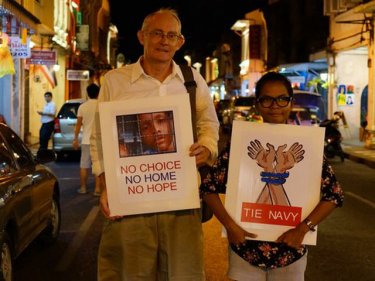

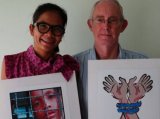
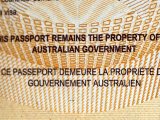
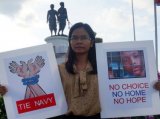
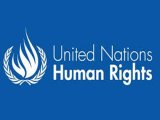
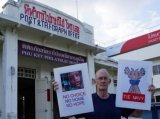

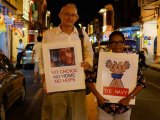



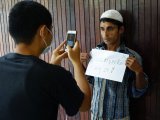



Your case is just a ridiculous over-reaction and rather than being a face-saving act, it has turned out to be an act of complete persecution.
The cases against Andrew Drummond are a joke. We have career fraudsters using the libel laws as a tool for them to try to intimidate and stifle reporting about their criminal deeds.
The Andy Hall case is another one where the libel laws are being abused and used to stifle reporting about people abusing the labor laws.
The courts need to wake up and stop letting people use these libel laws to silence critics.
Posted by Arun Muruga on November 15, 2014 11:45